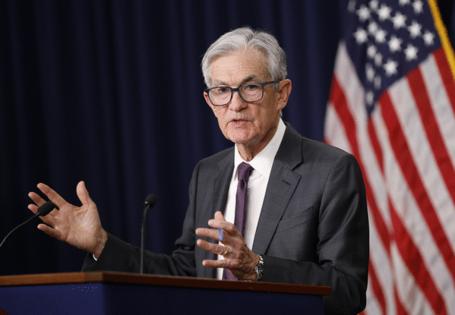Commentary: Trump, like Twain's cat, jumps from a hot stove
Published in Op Eds
Almost overnight, it seems, Donald Trump switched from outspoken foe of Federal Reserve Chair Jerome Powell — whom he had called a “major loser” whose “termination cannot come fast enough!” — to a smiling acceptance of Fed independence. The dramatic move is reminiscent of Mark Twain’s words: “If a cat sits on a hot stove, that cat won't sit on a hot stove again. That cat won't sit on a cold stove either.”
For the sake of world economic stability as well as our own, let us hope that like Twain’s remarkable cat, Trump has learned to leave this particular stove alone, even if quiet communication between a president and the Fed s to be expected.
The president’s word battle with the Fed had to do with interest rates, the cataclysmic collapse of U.S. financial markets following his April 2 tariff announcements and the budding global trade war his actions inspired.
Pointing to a promised “golden era,” Trump called for patience and noted there could be no gain without enduring some pain. He argued that the Fed should lower rates to cushion the untoward effects of his tariffs. Trump added that Powell had been too slow to act and that his job should be terminated.
With Fed independence threatened, world financial markets reacted immediately. The dollar fell, interest rates rose and commentators said U.S. Treasury issue was suspect. Some even posited that the era of American economic exceptionalism was over.
Trump learned the hard way that he, perhaps more than Powell, was a source of higher interest rates. Incidentally, Moody’s chief economist Mark Zandi predicted Trump would do this: ”As it becomes clear that the economy is struggling and the stock market’s down, there will be a shift in policy. He’ll pivot, declare victory, and wind down the trade war.”
Though Trump is the first recent president to openly call for a Fed chair to be fired, presidential battles (and alliances) with the Fed are nothing new.
George H.W. Bush had serious differences with Fed Chair Allen Greenspan, who raised rates in the lead-up to Bush’s unsuccessful reelection campaign. Bill Clinton had interest rate concerns in 1993. George W. Bush had a cooperative relationship with Chair Ben Bernanke in 2008 when Fed independence was forfeited in an effort to soften a recession that threatened to become a financial panic.
On the other hand, Barack Obama stayed aloof from the Fed and was later criticized for doing so. Ronald Reagan stands out perhaps most of all for refusing to sit on a stove. When asked in 1982 whether Chair Paul Volcker should be replaced for insisting on keeping interest rates high, Reagan said, ''I can't respond to that because the Federal Reserve System is autonomous.''
Monetary history is filled with stories of the inability of nations and central banks to control the urge to print money or deliver low interest rates as a way to satisfy political demand for more government services and quick prosperity. We’ve learned again and again that there is simply no such thing as a free lunch. Unfortunately, it seems, each generation must relearn the lesson the hard way.
The good news is that Trump has shown he can reverse position on policies that impose immense cost on America’s future prosperity. Like Twain’s cat, he is off the stove. For that we should be thankful. We can also hope that after this painful experience, Trump will stay off that stove forever.
____
Bruce Yandle is a distinguished adjunct fellow with the Mercatus Center at George Mason University and former executive director of the Federal Trade Commission.
___
©2025 Tribune Content Agency, LLC.




























































Comments